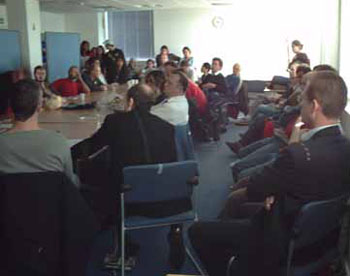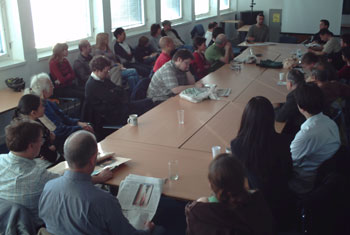HOV London meeting on non-renewal of RCTV licence
- 06 June 2007
 Following the non-renewal of the TV station RCTV this month,
Hands off Venezuela met at
the NUJ headquarters in London
to discuss what the real situation is. The mainstream media has generally
reported this as a closure of the TV station, rather than a decision by the
government not to grant a new concession on the public airwaves, and has been
used as a point of focus for those forces that oppose Venezuela’s
move toward socialism.
Following the non-renewal of the TV station RCTV this month,
Hands off Venezuela met at
the NUJ headquarters in London
to discuss what the real situation is. The mainstream media has generally
reported this as a closure of the TV station, rather than a decision by the
government not to grant a new concession on the public airwaves, and has been
used as a point of focus for those forces that oppose Venezuela’s
move toward socialism.
Student demonstrations and violence have broken out in Caracas, protesting against the non-renewal. The TV station has been running for 53 years, longer than any other in Venezuela. In December 2006 Chavez made public his intention not to renew the RCTV concession due to the station’s persistence in trying to overthrow the elected government, including participation in the April 2002 coup and the bosses’ lock-out later that year.
Over 50 people, filling the meeting room where many had to stand, attended the meeting. Jorge Martin, International Secretary for HoV, began by explaining some of the facts and figures around this issue (please see Venezuela and freedom of speech – 4 lies, 4 answers)
 Next Charley Allan, Member of the Hands off Venezuela steering committee, addressed the meeting having just arrived back in England from Bolivia where he had been invited to a gathering of intellectuals and artists supporting the Venezuelan revolution. Charley gave a report of his time spent there, and his visit to Caracas, where he described the discontent expressed by many ordinary Venezuelans on account of having been deprived of their daily soap-opera intake, provided by RCTV.
 A lively discussion followed, unfortunately not for long
enough due to the room booking, where students from Venezuela described their worries
and frustrations at what is happening in their country and the inability of the
private media to express itself and its interests, now that RCTV had only
satellite frequencies through which to operate. The debate got heated at times,
which is only natural when talking about matters so concrete and controversial.
A lively discussion followed, unfortunately not for long
enough due to the room booking, where students from Venezuela described their worries
and frustrations at what is happening in their country and the inability of the
private media to express itself and its interests, now that RCTV had only
satellite frequencies through which to operate. The debate got heated at times,
which is only natural when talking about matters so concrete and controversial.
The meeting finished with a screening of a government-produced film called Diga la verdad (Tell the Truth), which attempted to justify the ending of RCTV’s concession based on the supposed lack of morality that went into the TV station’s scheduling, as well as its role in the 2002 coup and other anti-government activities. Unfortunately, this short film did little to represent the political factors involved.
The meeting was very successful in its attempt to counter the anti-Chavez media campaign being spun around this recent event, which is cynically looking for a point of reference by which to mount another challenge to the revolutionary process taking place in Venezuela.